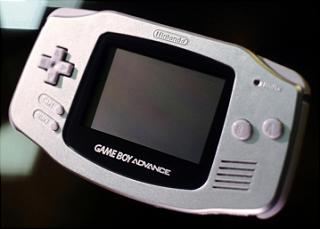
It has come to light that Nintendo has halted scheduled production of the original Game Boy Advance unit, with Nintendo of Japan MD Yoshihiro Mori stating that units would now only be manufactured to fulfil specific orders, illustrating the void in demand for the machine.
"Production of the original Game Boy Advance model is based on orders we receive because of our switch to the SP model," he said, which somewhat contradicts Nintendo's original plans to continue the product.
Regular SPOnG reader will remember that Nintendo's official line was that the SP wasn't in any way a replacement for the original Game Boy Advance, a machine universally slammed for being unplayable due to its poor quality, unlit LCD screen. It was suggested to Nintendo on numerous occasions that the SP was indeed a replacement for the GBA - a reaction to feedback and the embodiment of what the handheld should have been at launch. This was denied, with the Kyoto giant insisting that it wished to offer the same level of performance at two price-points aimed at two very different consumer bases.
It would seem that the perceived consumers of the original model barely exist.
And this news raises some interesting questions as to the role of the freshly unveiled Nintendo DS. Nintendo has been rigidly clear: The Dual Screen is not a replacement for the GBA, nor is it part of the Game Boy range. It is a stand-alone product, again aimed at different consumers to those targeted for Game Boy purchasing.
But, the same issue arises: As when the SP launched, demand for the original GBA plummeted. Whatever Nintendo may say about its positioning for the DS, how many consumers will buy an SP over a much more powerful machine? Price is seemingly meaningless in the current climate - today's news somewhat proves this with gamers and gadgetphiles happy to shell out additional cash for uprated performance - combine this with the fact that the DS will support Game Boy Advance software and it would seem that the SP's days are numbered, which, given that it's essentially a trumped up, shrunk-down SNES, is arguably a healthy thing for Nintendo, videogame players and the industry in general.
"Production of the original Game Boy Advance model is based on orders we receive because of our switch to the SP model," he said, which somewhat contradicts Nintendo's original plans to continue the product.
Regular SPOnG reader will remember that Nintendo's official line was that the SP wasn't in any way a replacement for the original Game Boy Advance, a machine universally slammed for being unplayable due to its poor quality, unlit LCD screen. It was suggested to Nintendo on numerous occasions that the SP was indeed a replacement for the GBA - a reaction to feedback and the embodiment of what the handheld should have been at launch. This was denied, with the Kyoto giant insisting that it wished to offer the same level of performance at two price-points aimed at two very different consumer bases.
It would seem that the perceived consumers of the original model barely exist.
And this news raises some interesting questions as to the role of the freshly unveiled Nintendo DS. Nintendo has been rigidly clear: The Dual Screen is not a replacement for the GBA, nor is it part of the Game Boy range. It is a stand-alone product, again aimed at different consumers to those targeted for Game Boy purchasing.
But, the same issue arises: As when the SP launched, demand for the original GBA plummeted. Whatever Nintendo may say about its positioning for the DS, how many consumers will buy an SP over a much more powerful machine? Price is seemingly meaningless in the current climate - today's news somewhat proves this with gamers and gadgetphiles happy to shell out additional cash for uprated performance - combine this with the fact that the DS will support Game Boy Advance software and it would seem that the SP's days are numbered, which, given that it's essentially a trumped up, shrunk-down SNES, is arguably a healthy thing for Nintendo, videogame players and the industry in general.
Companies:
Nintendo
Read More Like This
Comments
I just sold my advance on eBay, but I might as well have thrown in my SP. I don't mind the handheld evolving so quickly, but Nintendo should be straight with the public. Sure you can probably even still find GBC games, the market is so exceptionally huge, but when a new GameBoy comes out you better get it.
After the DS comes out: 1st party games for the SP will close to dissappear, only 3rd party crap will remain.
After the DS comes out: 1st party games for the SP will close to dissappear, only 3rd party crap will remain.
Ode to GBA
-----------
Oh GBA, we loved you so
Though your screen was a bit crap
And you hurt my hands after extended play
You sold many worldwide
Yet the SP is better
Although I'm still convinced the DS looks s**t
*fin*
-----------
Oh GBA, we loved you so
Though your screen was a bit crap
And you hurt my hands after extended play
You sold many worldwide
Yet the SP is better
Although I'm still convinced the DS looks s**t
*fin*
With te DS coming out many people will jump right on that band wagon. The problem is the DS is only backward compatible with GBA games not GB or GBC. So for those few of us that are still using some GB & GBC games the SP is our only salvation.
